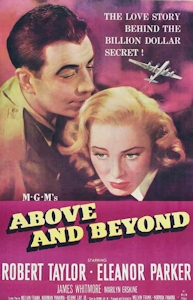The MGM War film, Above and Beyond, was nominated for two Oscars: Story for Beirne Lay and Dramatic Scoring for Hugo Friedhofer.
The story of Colonel Paul Thibbetts (played by Robert Taylor), the pilot of the plane that dropped the bomb on Hiroshima, tries to combine combat sequences with domestic chapters about Thibbetts and his wife (Eleanor Parker), who resents the secretive nature of his mission.
Grade: B
| Above and Beyond | |
|---|---|

Theatrical release poster
|
|
The film is directed by Melvin Frank, who co-produced with Norman Panama and wrote the screenplay based on Beirne Lay Jr.’s story.
The film is marred by the home sequences and by the casting of Jim Backus (better-known as James Dean’s father in Rebel Without a Cause) as General Curtis LeMay.
Lay received another Oscar nomination for Motion Picture Story for a better WWII picture, Strategic Air Command, in 1955, starring Jimmy Stewart.
Narrative Structure
In 1953, the Story Oscar went to Ian McLellan Hunter (the front for blacklisted Dalton Trumbo) for the romantic comedy, “Roman Holiday,” and the Score Oscar to Bronislau Kaper for “Lili” with Leslie Caron.
Col. Paul W. Tibbets Jr. (Taylor) is assigned to a dangerous mission in testing a new bomber, the Boeing B-29 Superfortress. The perilous assignment has caused his wife Lucy (Parker) to worry for his life and doubt whether their marriage can survive the separations.
After a year of scrutiny, Maj. Gen. Vernon C. Brent (Larry Keating) who championed Tibbets as a test pilot, selects him to lead new unit in the Pacific war, flying the B-29, armed with a new secret weapon. Scientists of the “Manhattan Project” explain what is “the best-kept secret of the war,” the atomic bomb.
Along with Maj. Bill Uanna (James Whitmore), the only other person who knows about the mission, Tibbets is expected to keep strict discipline over the personnel assigned to a B-29 conversion.
When families of crew members are brought to Wendover, tensions erupt within the Tibbets family due to Lucy’s attitude towards her husband’s secrecy about the use the atomic bomb.
Flying out to the Pacific island base of Tinian, the B-29 designated for the Hiroshima bombing is named the Enola Gay. Though the mission is a success, he wrests the aircraft around to escape the aftershock, the realization of the devastation.
Back on Tinian, although a second mission is mounted, the war has been decided by the actions of the B-29 bombers.
In the end, Tibbets returns home in Washington, where he has joyous reunion with his wife.
Taylor requested to be allowed to promote the film personally. He appeared on TV with clips from the picture. It was an unheard–revolutionary–procedure for MGM, a studio which withheld TV promotion for any of its movies up to 1953, and had not permitted any of its stars to make personal appearances.
Taylor’s promotion greatly assisted the box-office success of the film, which earned close to $4 million, against a budget of $1.4 million,
Cast
Robert Taylor as Colone Paul W. Tibbets
Eleanor Parker as Lucy Tibbets
James Whitmore as Major Bill Uanna (Security Officer)
Larry Keating as Major General Vernon C. Brent (fictional stand-in for Major General Uzal Girard Ent)
Larry Gates as Captain William “Deak”‘ Parsons, USN
Marilyn Erskine as Marge Bratton
Stephen Dunne as Major Harry Bratton, (fictional) co-pilot
Robert Burton as Brigadier General Samuel E. Roberts (Tibbets’ fictional CO in Africa)
Hayden Rorke as Dr. Norman Ramsey
Lawrence Dobkin as Dr. Van Dyke (as Larry Dobkin)
Jim Backus as Major General Curtis E. LeMay
Credits:
Directed by Melvin Frank, Norman Panama
Screenplay by Frank, Panama, Beirne Lay Jr. story by Beirne Lay Jr.
Produced by Melvin Frank
Cinematography Ray June
Edited by Cotton Warburton
Music by Hugo Friedhofer
Production company: MGM
Distributed by Loew’s Inc.
Release date: November 21, 1952
Running time: 122 minutes
Budget $1,397,000
Box office $3,980,000










